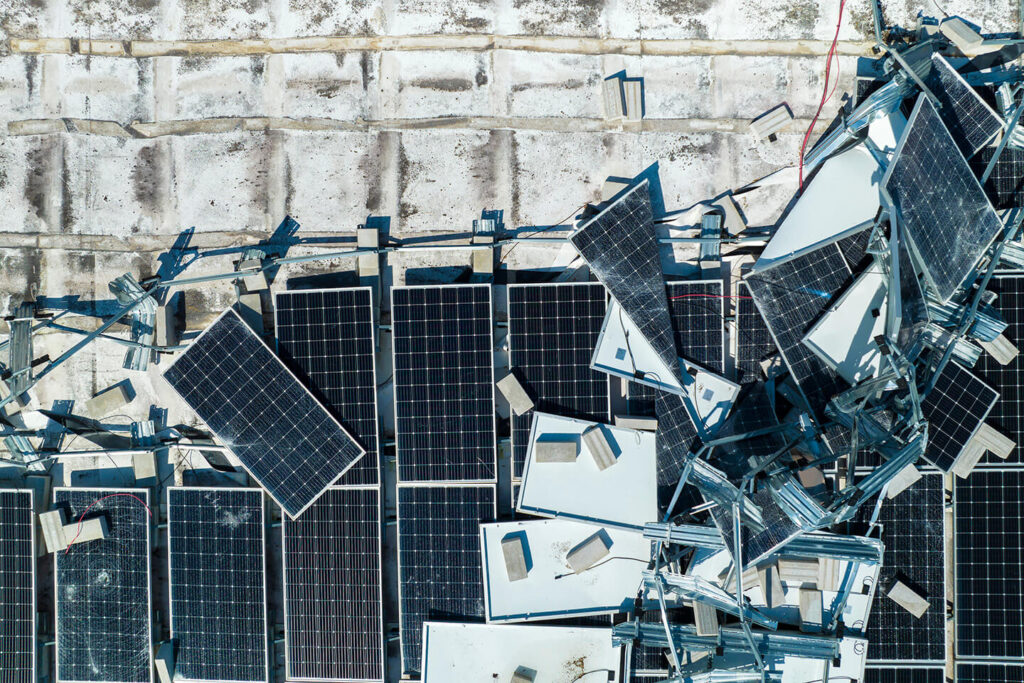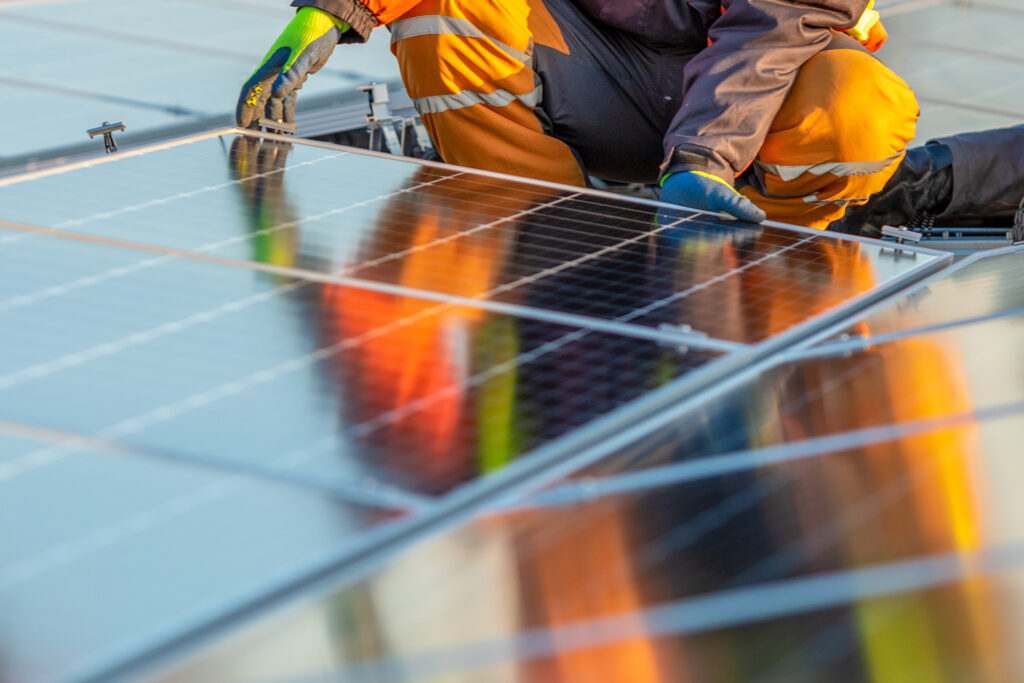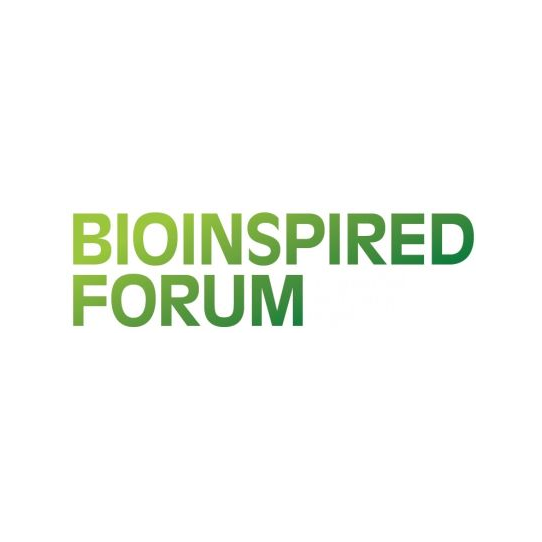CircSolar – a Circular Solution for Solar Panels
Solar energy is a clean and renewable energy source with significant environmental and climate benefits, but it also comes with challenges. Solar panels have a lifespan of about 30 years – with significant potential for repair, reuse, upgrade, and recycling. However, there is currently no circular system in place, neither for reuse or for fully managing all the glass, plastic, aluminum, silicon, silver, copper, lead found in worn-out solar panels. The CircSolar project brings together stakeholders from across the value chain with the goal of proposing a system for sustainable and financially viable management of solar panels.

Solar panel waste could reach more than 100 million tons by 2050.
The Issue
Solar energy is one of the fastest-growing energy sources in the world and is expected to become the largest source of renewable energy by 2029. Within the EU alone, 55 GW of capacity was installed in 2023. While this is a positive step in reducing carbon emissions, solar panels have a lifespan of two to three decades, and there’s currently no circular infrastructure for handling end-of-life panels. Without action, society could face an environmental challenge with an estimated more than 100 million tons of solar panel waste globally by 2050. Implementing a circular approach to panel management is crucial for ensuring the long-term sustainability of solar energy.
Our Solution
The goal of the CircSolar project is to develop a proposal for a new national system for the circular management of solar panels. The proposed solution aims to encompass business models, incentive and compensation structures, as well as policies to support the transition to more resource-efficient and circular management of solar panels throughout their lifecycle. Through the project, stakeholders across the value chain come together to explore the possibilities of a circular system for solar panels that ensures compliance with future legal requirements, secures access to essential recycled materials, reduces the use of virgin natural resources, and enhances the competitiveness of Swedish and European solar energy.
We aim to develop solutions that benefit all parties throughout the system. To succeed we bring together researchers as well as practitioners across the value chain – from installers to industry organizations to recyclers and producer responsibility organizations.
– Johanna Olofsson Behrman, Project Manager Future Materials, Axfoundation
Project Goals:
- System Analysis: Analyze the circularity of the current value chain for solar panels in Sweden.
- Future Scenarios: Develop scenarios for the future of solar panels in Sweden, including expected types of solar panels on the market, when the panels will become obsolete, available circular options, and anticipated future regulations.
- Circular System for Solar Panels: Propose a concrete system for the circular management of solar panels, including business models and policies that support the transition to a resource-efficient and circular lifecycle for solar panels.
- Collaboration: Establish conditions that foster collaboration among stakeholders to drive change and develop a sustainable, long-term system for solar panel management.

Solar energy is expected to account for 12% of total global power capacity by 2028, compared to less than 1% in 2010.
Our Work
Axfoundation is project lead in CircSolar and collaborates with key players across the value chain, from producers to recyclers. Our role is to bring together expertise and perspectives to develop sustainable solutions. The project runs until August 2026 and commenced with Axfoundation’s Do Tank at Torsåker Farm in October 2023.
We have an opportunity to do things right from the start and proactively develop a system that is ready to handle the upcoming large volumes of worn-out solar panels, but it requires action now and from the entire industry.
– Martin Seeger, El-kretsen, a Swedish provider of collection systems for consumer electronics.
Did you know…
- Solar panels significantly reduce carbon dioxide emissions from electricity production by using solar energy instead of fossil fuels. In 2010, solar energy generated approximately 96% fewer greenhouse gas emissions than coal and 93% less than gas (Solar Power Europe).
- Solar energy accounts for 4.5% of total global power capacity and is expected to become the largest renewable energy source by 2029 (IEA). In Sweden, solar power makes up 2.4% of electricity production (The Swedish Energy Agency).
- The lifespan of solar panels is estimated to be around 30 years (Solar Power Europe).
- Solar panels consist of 60-67 % glass, 16% aluminum, 11% plastic, 4% silicon (silicon), and 1% other metals (e.g. copper, silver, lead) (Rise & The Swedish Energy Agency).
- Currently, China dominates global solar panel production with a share of over 80% in all manufacturing steps (IEA).
- In Sweden, it is estimated that the recycling of materials from solar panels corresponds to 17% of the total weight (The Swedish Energy Agency).
- In theory, nearly all materials in a solar panel can be recycled, but this type of recycling is not financially viable today.
Partners
The project partners are Axfoundation, El-kretsen (a Swedish provider of collection systems for consumer electronics), KTH Royal Institute of Technology, REMONDIS, Stena Recycling, and Svea Solar. The reference group includes AxSol, Alight, INGKA Group (IKEA), Nordcell, Nätverket för solparker, RISE, SolTech Energy, Sonat, The Sunshine Fund, Sesol, EnergiEngagemang, Driva and the Swedish Solar Energy Association.
The project maintains an open door for additional actors who wish to participate to foster collaboration and bring about systemic change. The work is supported by Vinnova.
















































